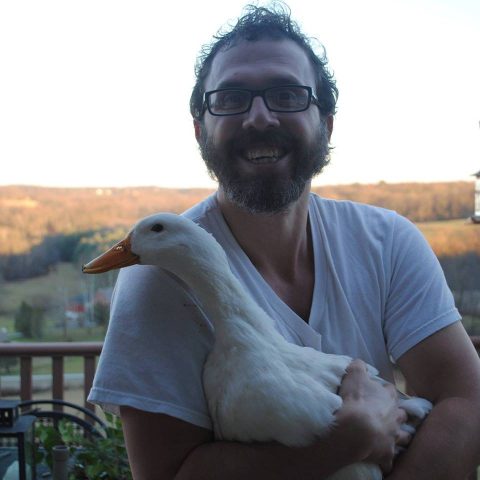Michael B. Tager is Managing Editor of Mason Jar Press. Michael will be giving away a copy of their most recent title, The Bong-Ripping Brides of Count Drogado by Dave K., to the writer of the story he chooses for publication this week.
What kind of story would you love to see in the queue this week? Are there certain themes or styles you’re particularly drawn to?
I’m also a genre writer in addition to literary fiction, so I have a soft spot for elements of fantasy, sci-fi, horror, magical realism. Stuff that happens outside the everyday world. I haven’t read a ton of flash that marries genre and literary conventions, so I’d love to get a little bit of writing that stretches what we conceive of as reality.
What do you think is essential to good flash fiction? What is one thing that would make you stop reading a story?
I think these two questions are really married. I don’t think there are any hard-and-fast rules when it comes to writing, flash or not. Get away with what you can get away with! If it’s written well, you can pull a fast one.
That said, I like my flash tight, with no wasted space and words. I like it focused. That doesn’t mean I want a lot of stuff to happen, necessarily. I don’t mean a tight plot. I don’t mean focused storytelling. I more mean–whatever the intention in the flash, be it a piece in love with words, a piece that’s into dialogue, into plot–I want it cranked up and on brand. One thousand words isn’t a lot of room, so the writer’s self-editing game should be tight. Not-tight self-editing is probably a non-starter for me. But who knows!
You write fiction, poetry and creative nonfiction. Can you talk about how you move between genres? Do you have a favorite?
This is kind of a long answer because I’ve thought about it a lot. I originally only wrote fiction and didn’t consider writing anything else. But I started to hear, and started to agree with, that writing is writing and it’s all connected. You write: you get better and the venue doesn’t matter. And why not play in other sandboxes? What makes this one sandbox the best? Because there’s sandcastles and that Tonka Truck that unloads dirt? Other sandboxes have dope toys too. (This metaphor is breaking down.)
And of course, being a writer, you’re constantly meeting writers who primarily write something else. Constant exposure counts for something. But I learned a lot from this inundation of other writing and I started to draw from others’ knowledge and skills. It was all just sitting there, this expertise to be gained from poets and romance writers and news reporting. I read a dope 2nd-person recap of a Dodgers-Padres game, which no one this side of the country has any interest in. But it was so well written and clever that I wound up aping it in a short story.
I’ve learned a lot from reading poetry (and I’ve always read nonfiction). I’ve also learned from established authors like Michael Chabon or Abigail Thomas who made a point to mention that they read poetry every night, even if they didn’t write it themselves. Sounded like good advice to me.
Poetry, to me, is all about putting together images and phrases that haven’t been put together before, while still telling a narrative. It might not be a linear narrative, but I find the best poetry tells a story in weird ways. There’s really no reason this can’t inform my prose writing. And the similarities between fiction and nonfiction (especially creative) are already there in form and, in a lot of ways, intent. I find the best prose tells honest truths in interesting ways. While in fiction I borrow from my life and then fill the rest in by lying and making shit up, in nonfiction I minimize the lying. It’s like wish-fulfillment versus what really happened. And they inform each other, inform poetry and are informed by poetry’s language. It’s a cycle and I feel that all my writing gets better the more I screw around in other forms.
That being said, I’m a fiction dude. I’m writing a fiction series for Barrelhouse and I recently completed my novel, which is out in the wilderness of agentland. I’m also working on a collaborative fantasy series of short stories with an illustrator. So, way more pies in the oven with fiction than anything else. That says something.


 The core workshop of SmokeLong Fitness is all in writing, so you can take part from anywhere at anytime. We are excited about creating a supportive, consistent and structured environment for flash writers to work on their craft in a community. We are thrilled and proud to say that our workshop participants have won, placed, or been listed in every major flash competition. Community works.
The core workshop of SmokeLong Fitness is all in writing, so you can take part from anywhere at anytime. We are excited about creating a supportive, consistent and structured environment for flash writers to work on their craft in a community. We are thrilled and proud to say that our workshop participants have won, placed, or been listed in every major flash competition. Community works.